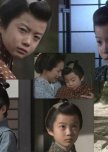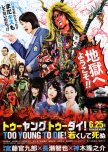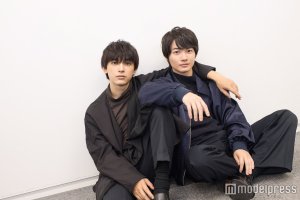
The Synopsis does a diservice.
The synopsis does a disservice to this wonderful gem. This is a tale about two people at opposite ends of their lives coming together and finding solace through their journey together, Shota who is at the main starting point in his life and Jun-chan who is at the last part of his life both try to runaway from their realities. Shota who for the most part of his life lacked adult guidance, is mature but innocent as a neglected child of that age would be. Jun-chan who is still contemplating the passage of time and how he is at the end of his life, a frail old grandpa who has no one he knows alive anymore. At it's heart this is a coming of age story. Just because we age doesn't mean we learn to be adults. Naoki-san with his expressions and body language portrays the frailty, vulnerability and stubbornness that a young man who suddenly realizes he is an old man and life has long passed him by and the window of opportunities have long shut. While the young Kamiki, is phenomenal as Shota, I would go as far as to say this is his best and most realistic acting of that era. We see Shota at the beginning of the drama, as a mature child. He calmly leaves his home, carefully packs, even is aware enough to bring first aide and money along. However during uncertainties he breaks down and we see the innocent child trying to hide behind an adult mask, A child so desperate for adult guidance, that when he finds the reliable Jun-chan, he sticks to his side like a glue, from that point we finally see the whinny child, who wants attention, who is curious and hurt easily. His inexperience with the world is paired well with Jun-chan's life experiences. One has all the experience and the other has none, but neither of them are truly grasp the current world they live in. Jun-chan whose world has long gone and Shota whose hasn't started. They are aliens to the current world they live in. Jun-chan feels relevant while taking care of the young Shota, he feels needed. Shota on the other hand feels he is being heard and seen. In most scenes they are at conflict with each other, a battle of different generations. Not very different from arguments grandparents and grandchildren, each coming from their own life experiences while not trying to understand where the other is coming from. By the end of their journey they learn lessons from each other, forming a bond deeper than bloods. This is a very worthwhile drama to watch. The innocence and vulnerability is charming. The acting grounded and layered. The story is relevant for every generation, as most people in their lives will have been Shota and Jun-chan at different times. What happens when the end and the beginning meet. This is charming drama full of nuances and allegories. The drama is full of juxtapositions as it is both hopeful and depressing at the same time. I was watching it with my mother, who is not interest in jdramas nor dis she understand what they were saying but multiple themes of connection, negligence, childhood, and the eventual death were things she picked up right away. Honesty it is a masterpiece and more people should watch it.Considerați utilă această recenzie?

A historical drama which can drawn the viewer in without a flashy sword fight.
I started watching Omiya (NHK, 2002) during it's re-run.Omiya is a work by Yumie Hiraiwa, and the
main character is Omiya played by Reiko Takashima.
Unhappiness attacks this Miya one after another.
The beginning of bad luck was to marry into a samurai's house.
Abused by the mother-in-law, the husband passes away,
Her child torn from her, and being misunderstood by her loved one ... Even her
younger brother Shinnosuke is dying.
(Not only Omiya, but Omiya's parents' house itself is too unlucky ...)
Koji Yamamoto plays this Shinnosuke.
Still a naive young man, but after
all the frustrations and impatience peculiar to young people are well brought out!
Another one of the top Performers is Taro Yamamoto who played Harada Sanosuke.
It's a role where the character is smitten with Omiya, but
also a naive good young man.
Ryunosuke Kamiki, who plays Omiya's son Seiichiro , leaves a strong impression. Ryunosuke-kun was also selected as a child in the taiga drama "Yoshitsune" three years later, but it was because of
this brilliant performance in Omiya.
Also, as can be said for "Omiya" and "Inemuri Monzo", "Kagero
no Tsuji 2" expresses the subtleties of human relationships well,
and you will be drawn in without a flashy sword fight. ..
Considerați utilă această recenzie?

Too Young To Die!
1 oamenii au considerat această recenzie utilă
Nagase is endearing as Killer K, but the uniform-clad Kamiki is the scene-stealer.
In this demonically divine musical comedy, "Motherf--ker!" almost becomes Japan’s national morale-booster "Ganbatte!" ("Do your best!") — so often is it hollered like a war-cry — yet judging by the guffaws it consistently elicits, the film’s outlandish, self-reflexive irreverence has struck the right chord. Helmer and writer Kankuro Kudo (Yaji and Kita: The Midnight Pilgrims) has managed to turn a simplistic tale of love and life choices into a thoroughly entertaining two-hour extravaganza through wacky allusions to rock music, absurd interpretations of Buddhist beliefs, and spots of well-placed humor.The story is about a high school student Daisuke who has a crush on his classmate Hiromi . The bus they’re on crashes and Daisuke wakes up to find himself face-to-face with the swashbuckling demon Killer K in hell — Buddhist hell. Daisuke, with K’s help, embarks on a quest to leave Inferno, but expectedly, gets sidetracked — by K’s backstory and hellish bureaucracy.
There’s strong comedic chemistry between Killer K and Daisuke. K with his painted face, big hair and medieval-glam rock gowns is what happens when KISS crosses over with Kabuki theatre, and it’s brilliant. By contrast, Daisuke has the pale androgynous visage of a millennial. Nagase, a contemporary of 90s heart-throb Kimura Takuya, is endearing as Killer K, but the young uniform-clad Kamiki is the scene-stealer.
The music is definitely a highlight of the film, one which helps to make the sometimes random humor and repetitiveness palatable. Ranging from metal to blues, and always given a ‘feel-good’ rendition, the pieces come with witty commentary about the industry, like what happens if you play the guitar with arms borrowed from Jimmy Hendrix, Gary Moore and Randy Rhoads?
Heaven is portrayed as Japanese society on steroids. It’s a pristine futuristic expanse that bans sounds over 20 decibels, and two passive-aggressive guardians carry this out with the efficiency of a world-class metropolis. The one-stop remote has buttons for everything, including sex and suicide. Kudo’s experience in theatre is evident in the actors’ stylized movements and the minimalist sets. And it’s this inventive presentation, as well as snide comments about hell’s badassism, that saves the boring-paradise versus tantalizing-hell dichotomy from feeling like a big cliche.
The costumes and sets are a tad formulaic but then the film makes it clear that it thrives on kitsch. In fact Too Young to Die has enough quirk and kitsch to be cult, if it wasn’t for the clever humor.
Considerați utilă această recenzie?




